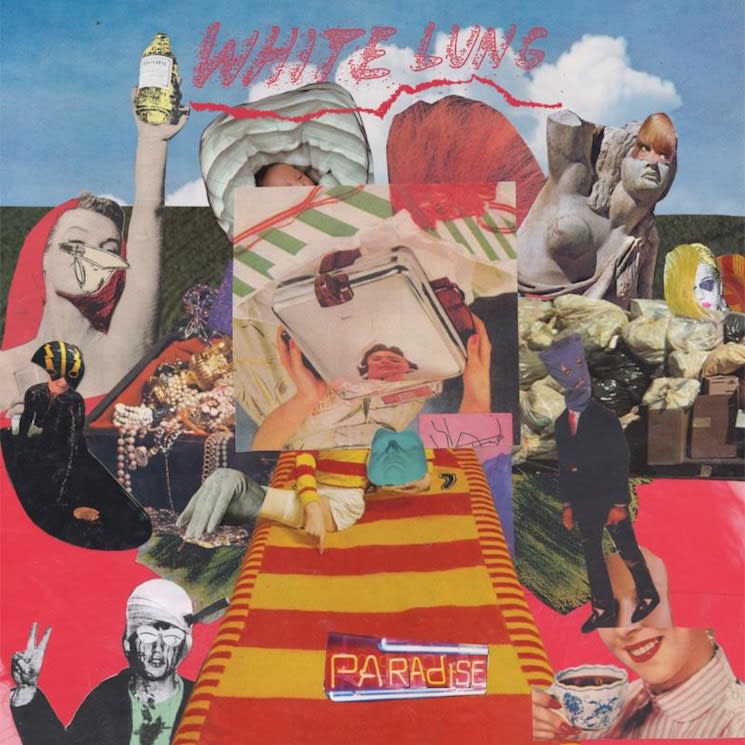About 20 seconds into "Narcoleptic," the second song on White Lung's latest, Paradise, Kenneth William's guitar drops out of the mix, leaving his band mates to carry the track. While hardly groundbreaking, it's a jarring move for a band whose sound, up to this point, has been defined by his claustrophobic blitzkrieg.
White Lung pride themselves on overwhelming listeners, pushing their skills to the limit, and though it sometimes seems like they may box themselves into a corner, with each release the Vancouver- and Los Angeles-based quartet manage to push the walls further outward, making subtle tweaks to their formula that reveal deeper depths to their aural attack.
Leaving behind Vancouver and long-time producer Jesse Gander, Paradise was recorded in Los Angeles with Lars Stalfors. Known for his work with the Mars Volta and Matt & Kim, Stalfors helps the band introduce more aggressive dynamic shifts and a newfound sense of melody to their sound, two elements that, on paper, should dull their aggressive edge. In practice, though, the short respites from William's busy and inventive fretwork add breathing room to songs like "Hungry," giving added weight to the guitars when they do drop back into the mix.
But the real breakthrough here is singer Mish Barber-Way's total embrace of melody. Where her lyrics were previously transmitted as a wail, one part of the band's sonic assault, here her melodies take centrestage. "Below" is an immediate standout, a "Stevie Nicks-meets-Celine Dion ballad" about faded glamour that finds the singer's words soaring overtop of her band mates' more measured approach.
That's not to say that White Lung can't still rage; "Sister" and "Vegas" fit neatly into their oeuvre, while "Kiss Me When I Bleed" and "Dead Weight" continue to push the boundaries of their sound in small but significant ways. Now, however, these tracks feel minor next to the album's towering totems, which reap the benefits of the band's more dramatic sonic shifts. White Lung sound both heavier and more accessible on Paradise, once again proving that there's far more to this band than meets the eye.
(Domino)White Lung pride themselves on overwhelming listeners, pushing their skills to the limit, and though it sometimes seems like they may box themselves into a corner, with each release the Vancouver- and Los Angeles-based quartet manage to push the walls further outward, making subtle tweaks to their formula that reveal deeper depths to their aural attack.
Leaving behind Vancouver and long-time producer Jesse Gander, Paradise was recorded in Los Angeles with Lars Stalfors. Known for his work with the Mars Volta and Matt & Kim, Stalfors helps the band introduce more aggressive dynamic shifts and a newfound sense of melody to their sound, two elements that, on paper, should dull their aggressive edge. In practice, though, the short respites from William's busy and inventive fretwork add breathing room to songs like "Hungry," giving added weight to the guitars when they do drop back into the mix.
But the real breakthrough here is singer Mish Barber-Way's total embrace of melody. Where her lyrics were previously transmitted as a wail, one part of the band's sonic assault, here her melodies take centrestage. "Below" is an immediate standout, a "Stevie Nicks-meets-Celine Dion ballad" about faded glamour that finds the singer's words soaring overtop of her band mates' more measured approach.
That's not to say that White Lung can't still rage; "Sister" and "Vegas" fit neatly into their oeuvre, while "Kiss Me When I Bleed" and "Dead Weight" continue to push the boundaries of their sound in small but significant ways. Now, however, these tracks feel minor next to the album's towering totems, which reap the benefits of the band's more dramatic sonic shifts. White Lung sound both heavier and more accessible on Paradise, once again proving that there's far more to this band than meets the eye.
